|
I've been hired to mix Kip Winger's solo show and provide all the sound equipment.
I am allowed to use any audio design I want. The
opening band will provide guitar stands and backup supplies. First thing I do is learn about
the artist on the internet. Listen to the music, read wikipedia, see live videos, etc. Learn the man.
He plays a 12 string acoustic when solo, in bands he's played lead guitar and bass. He's got a good voice.
|
|
|
The previous show in this venue, I used three loudspeakers. Left right and one for the bar.
This was okay for the opening act, but when the headliner got onstage everyone crowed real close
with camera's and cellphones. This wasn't anticipated, and I was sure I could design better sound for
the audience when they made the 270° arch in front of the stage.
|
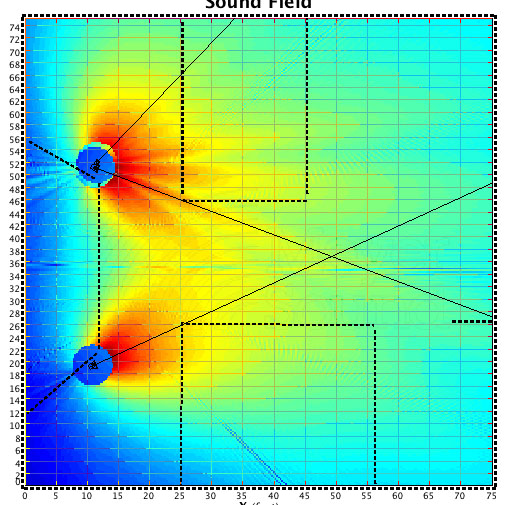
|
|
Using Meyer MAPP acoustic prediction software, I try a few different ideas out and see how they develop.
Here's two ideas that were better than before. Changing levels got the first picture and adding more
speakers got the second image, but I knew I still could do better ...
|
|
|
What I ended up deciding to do was this image, except I added two more speakers in the front.
They were little mini speakers which helped a great deal for two rows about 5 people wide. The
ten or so people most up front got a great sounding show. Six main speakers and two dual 18" subs.
You might think it was "too much," but with the audience shape only 5 rows deep but 70 feet wide, you
need that many speakers just to get each location covered. And Kip's bass playing days were evident as his
twelve string acoustic guitar was tuned down and he really got a deep thump in his rhythm with Meyer 650-R2 subs.
|
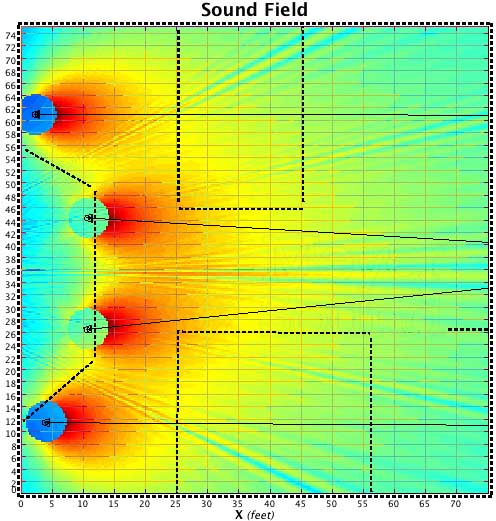
|
|
Now that acoustics have been planned, time to put the position into 3 Dimensional CAD and check sight
lines and make sure the layout of the stage will actually work. I was quite concerned it was looking
stupid as I set it up, but once it was set up it looked very nice, and sounded really nice
|
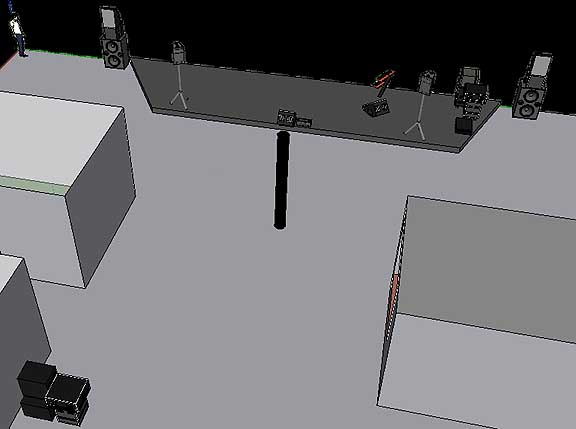
|
|
The main mixing position, "Front of House" is set up. Each vocal and guitar input was split to two mixer channels
so mains and monitors of each input would have separate EQ. All Main and Monitor speakers were controlled by
Meyer Galileo for level, delay and parametric EQ. In addition Kip winger's vocal was inserted through Galileo for
TruShape and Parametric EQ adjustments. Kip's vocal was compressed with Separate BSS404 compressor/deessors
for monitors and mains. Kip compressed his guitar himself with his Boss compressor.
|
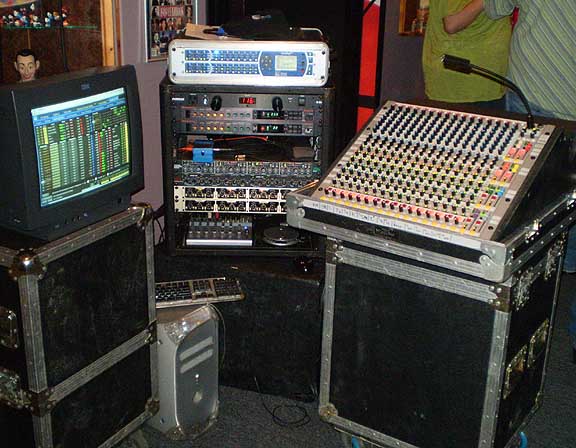
|
|
The six main speakers and 2 sub woofers are set up.
Kip had two monitors each with active crossovers and dual amplifiers. Once he finished
soundcheck his monitor positions were marked with tape and the monitors were moved for the opening act.
|
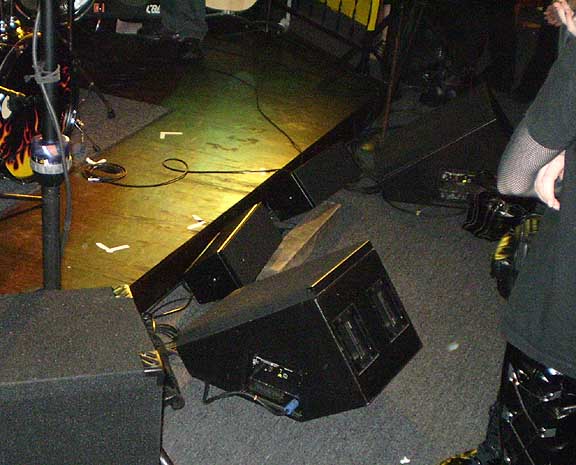
|
|
The newly added mini speakers used for front fill did an amazing job !!
Other speakers were nearby, and a "Side-lobe Study" with Meyer SIM3 directed me to an equalization
with an impressive amount of low frequencies being reduced (but not removed) so that the tonality at
the side between the main speakers was just as clear as further back and in front of the main speakers
|
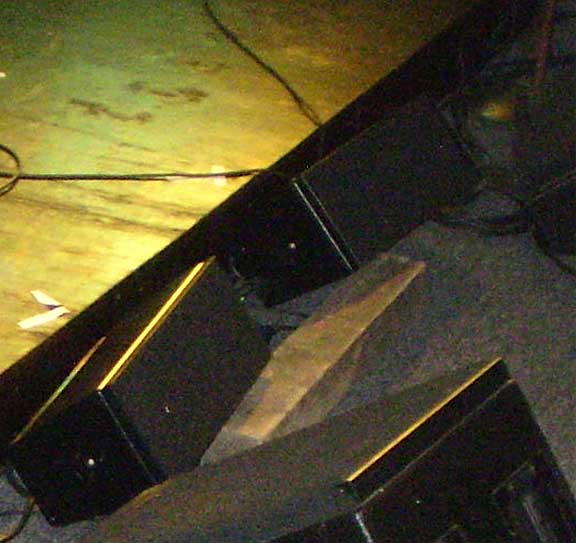
|
|
The opening act has performed. And after a break ... Kip Winger appears to perform for an intimate performance.
|
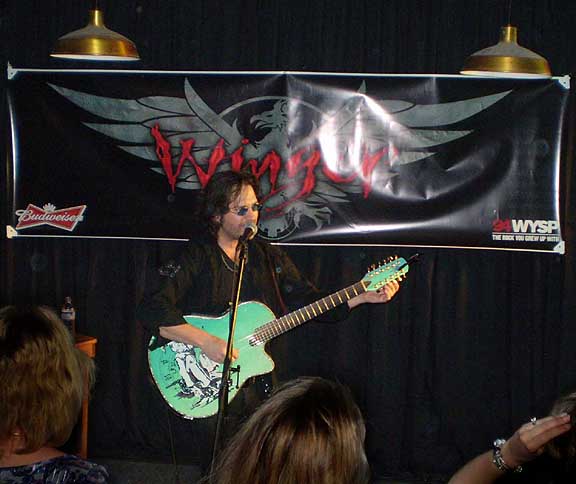
|
|
|
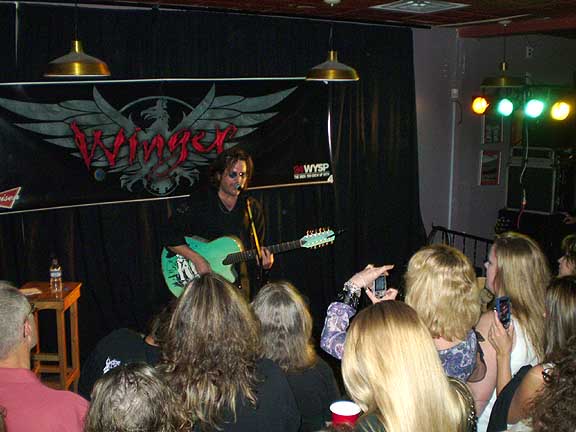
|
|
Click any photo to enlarge
Kip Winger turned out to be very friendly with everyone indeed and had a meet with each fan in the venue.
|
|
|
Kip also posed for a photo with me, as many other people were taking their own photos of the moment.
|
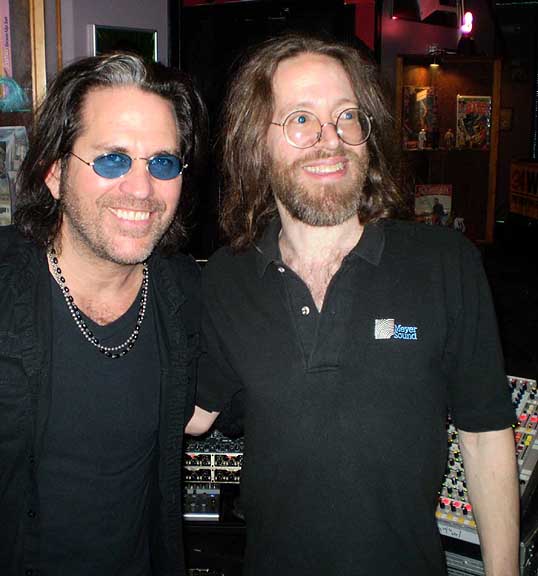
|
|
I got a screen shot of the Galileo loudspeaker processor during a moment in the show when the guitar was
being played hard and Kip was singing loudly. Headroom available is about 36dB at that moment
Inputs A through F have labels for the source. Input D is Kip Winger's house channel insert after the
BSS compressor. Outputs 1 and 2 are EQing the monitors, 4 is EQing Kip Winger's mic, 9 is EQ and level for two mono
front fills, 11 and 12 are level for subs, 13 through 16 are Mains in Right-Left-Right-Left assigned from house
left to right.
|
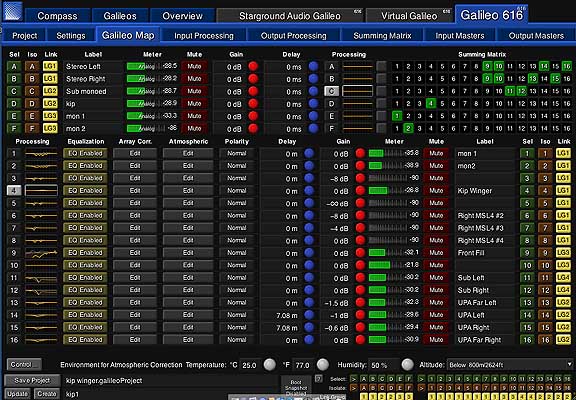
|





